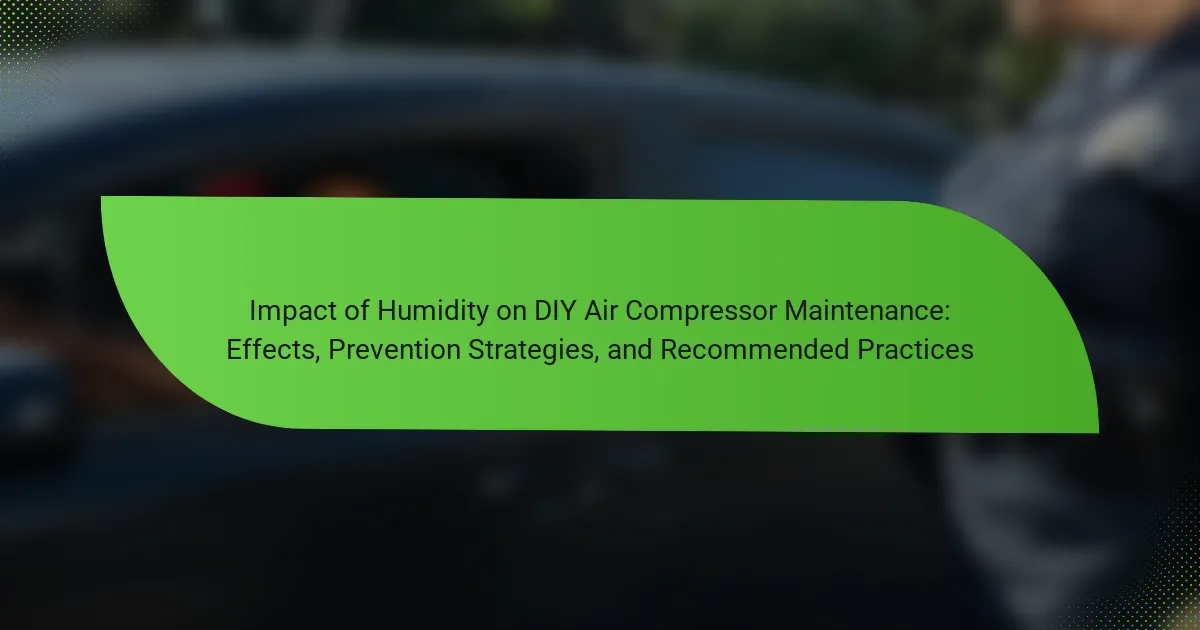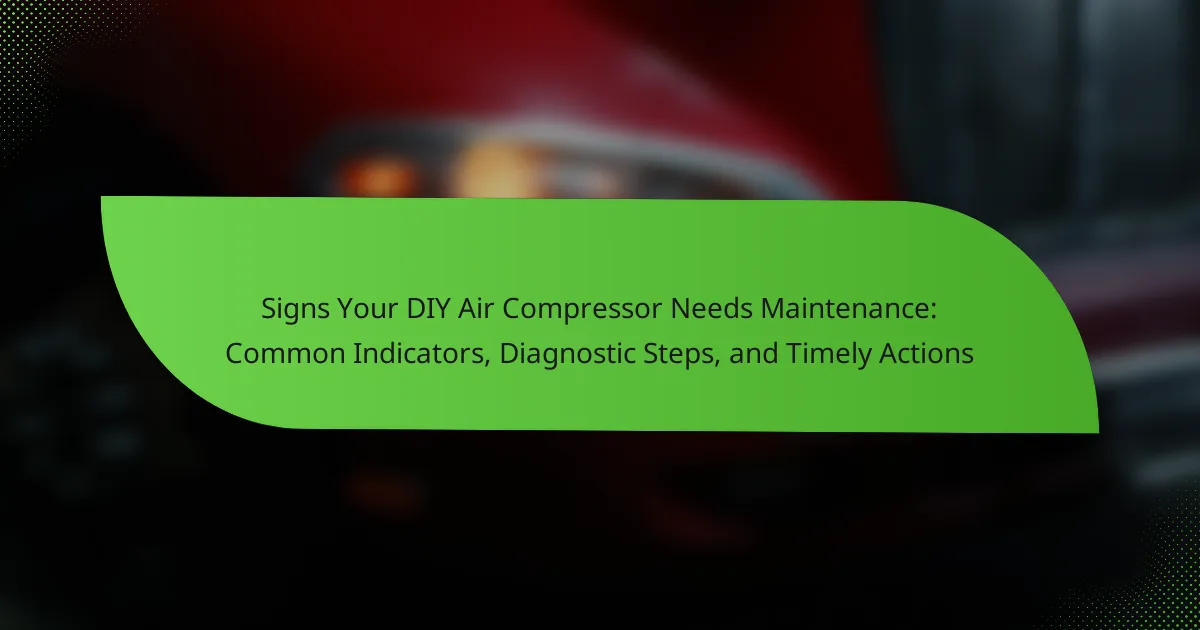Oil changes are a critical maintenance practice for DIY air compressors, significantly impacting their performance and longevity. Regular oil changes, typically recommended every 50 to 100 hours of operation, help prevent the buildup of contaminants and ensure proper lubrication of internal components. This maintenance not only enhances operational efficiency but also reduces the risk of costly repairs due to overheating or mechanical failure. Both mineral oil and synthetic oil are suitable for use in these compressors, with each type offering distinct benefits in lubrication and protection. Overall, adhering to recommended oil change intervals is essential for maximizing the efficiency and reliability of DIY air compressors.

What is the importance of oil changes in DIY air compressors?
Oil changes in DIY air compressors are crucial for maintaining optimal performance and longevity. Regular oil changes prevent the buildup of contaminants that can hinder efficiency. Clean oil ensures proper lubrication of internal components, reducing wear and tear. This maintenance practice can enhance the compressor’s operational lifespan significantly. Studies indicate that compressors with regular oil changes run more efficiently, leading to lower energy consumption. Additionally, changing oil at recommended intervals helps avoid costly repairs due to overheating or mechanical failure. Overall, oil changes are essential for ensuring reliability and performance in DIY air compressors.
Why are oil changes crucial for the performance of DIY air compressors?
Oil changes are crucial for the performance of DIY air compressors because they ensure proper lubrication and reduce friction. Regular oil changes help maintain optimal operating temperature. This prevents overheating and extends the lifespan of the compressor. Clean oil effectively removes contaminants and debris, which can damage internal components. Neglecting oil changes can lead to increased wear and tear. This results in decreased efficiency and potential mechanical failure. Manufacturers recommend specific intervals for oil changes to maintain performance. Following these guidelines ensures reliable operation and longevity of the air compressor.
What specific problems can arise from neglecting oil changes?
Neglecting oil changes can lead to severe engine damage. Oil loses its effectiveness over time, allowing contaminants to build up. This buildup can cause increased friction within the engine. Increased friction leads to overheating, which can damage engine components. Additionally, neglecting oil changes can result in reduced fuel efficiency. A study by the American Automobile Association found that regular oil changes can improve engine performance. Without proper lubrication, parts can wear out faster, leading to costly repairs. Ultimately, neglecting oil changes can shorten the lifespan of the engine.
How does regular oil maintenance enhance compressor lifespan?
Regular oil maintenance enhances compressor lifespan by ensuring optimal lubrication and reducing wear. Proper lubrication minimizes friction between moving parts. This reduction in friction leads to less heat generation. Lower operating temperatures contribute to improved efficiency. Regular oil changes prevent the buildup of contaminants. Contaminants can cause damage to internal components. Maintaining clean oil supports consistent performance. Studies show that compressors with regular oil maintenance can last significantly longer than those without.
What are the benefits of performing regular oil changes?
Regular oil changes enhance engine performance and longevity. Clean oil reduces friction between engine components. This minimizes wear and tear, prolonging engine life. Regular changes also improve fuel efficiency. Engines with clean oil operate more efficiently, consuming less fuel. Additionally, fresh oil helps remove contaminants. This prevents sludge buildup, which can cause engine damage. Studies indicate that regular oil changes can increase engine lifespan by up to 30%. Following manufacturer recommendations for oil change intervals ensures optimal performance.
How do oil changes improve efficiency in DIY air compressors?
Oil changes improve efficiency in DIY air compressors by ensuring optimal lubrication of internal components. Fresh oil reduces friction between moving parts. This leads to smoother operation and less energy consumption. Efficient lubrication also prevents overheating, which can damage the compressor. Regular oil changes help maintain consistent pressure levels. Consistent pressure enhances the compressor’s performance and lifespan. Studies show that well-lubricated compressors operate up to 20% more efficiently. Maintaining the correct oil level is crucial for maximizing efficiency.
What impact do oil changes have on energy consumption?
Oil changes reduce energy consumption in engines. Fresh oil minimizes friction between moving parts. This leads to improved efficiency and performance. According to the U.S. Department of Energy, regular oil changes can enhance fuel economy by 1-2%. Efficient engines consume less fuel and produce fewer emissions. Regular maintenance, including oil changes, is essential for optimal energy use.

What are the recommended intervals for oil changes in DIY air compressors?
Oil changes in DIY air compressors are typically recommended every 50 to 100 hours of operation. This interval ensures optimal performance and longevity of the compressor. Some manufacturers may suggest changing the oil more frequently, especially under heavy usage conditions. Regular oil changes help prevent wear and tear on internal components. Additionally, checking the oil level and quality before each use is advisable. This practice can help identify potential issues early. Following these guidelines can enhance the efficiency and reliability of the air compressor.
How often should oil changes be performed based on usage?
Oil changes should be performed every 50 to 100 hours of usage for DIY air compressors. This interval ensures optimal performance and longevity of the compressor. Frequent use may necessitate more frequent changes, while occasional use allows for longer intervals. Regular oil changes help maintain proper lubrication and prevent wear. Manufacturers often specify these intervals in user manuals. Following these guidelines can enhance efficiency and reduce the risk of breakdowns.
What factors influence the frequency of oil changes?
The frequency of oil changes is influenced by several factors. These factors include the type of oil used, the manufacturer’s recommendations, and the operating conditions of the air compressor. Synthetic oils generally allow for longer intervals between changes compared to conventional oils. Manufacturers often provide specific guidelines based on the compressor’s design and usage. Operating conditions such as temperature, humidity, and load can also affect oil degradation. Heavy usage or extreme environments may necessitate more frequent changes. Regular maintenance checks can help determine the optimal oil change frequency.
Are there guidelines for oil change intervals in different compressor models?
Yes, there are guidelines for oil change intervals in different compressor models. These intervals can vary based on the manufacturer’s specifications. Typically, oil change recommendations range from every 500 to 2,000 operating hours. Some manufacturers suggest checking oil levels and quality every 100 hours. Factors such as operating conditions and oil type also influence the frequency. For example, heavy-duty use may necessitate more frequent changes. Always refer to the compressor’s user manual for specific guidelines. Following these recommendations helps maintain optimal performance and longevity of the compressor.
What signs indicate that an oil change is needed?
Signs that indicate an oil change is needed include a dark, gritty appearance of the oil. Fresh oil is typically amber in color. If the oil appears black or dirty, it is time for a change. Another sign is an unusual engine noise. This can indicate that the oil is not lubricating effectively. Additionally, if the oil level is low, it may be time for a change. Regular checks of the dipstick can help monitor oil levels. Finally, if the oil change light is illuminated on the dashboard, it signals the need for maintenance. These signs help ensure the smooth operation of the engine.
How can users identify oil contamination or degradation?
Users can identify oil contamination or degradation by observing changes in color, consistency, and smell. Darkening of the oil indicates oxidation and potential contamination. A milky appearance suggests the presence of water, which compromises oil quality. If the oil feels gritty or has particles, it indicates contamination with dirt or metal shavings. An acrid or burnt smell signifies overheating and degradation. Users should also check for foam or bubbles, which can indicate air contamination. Regular visual inspections and smell assessments help maintain oil quality in air compressors.
What are the visual and performance indicators of needing an oil change?
Visual indicators of needing an oil change include dark, dirty oil and the presence of particles or sludge. Performance indicators include engine noise, reduced power, and poor fuel efficiency. Dark oil indicates contamination and breakdown of lubricating properties. Sludge formation can block oil passages. Engine noise often signifies inadequate lubrication. Reduced power can occur when oil fails to lubricate effectively. Poor fuel efficiency can result from increased engine friction due to old oil. Regular checks can help maintain optimal performance and prevent damage.

What types of oil are suitable for DIY air compressors?
Mineral oil and synthetic oil are suitable for DIY air compressors. Mineral oil is commonly used due to its affordability and effectiveness in lubrication. It provides good protection against wear and tear. Synthetic oil offers superior performance and stability under extreme temperatures. It also reduces carbon buildup and extends the lifespan of the compressor. Both types help maintain optimal functioning and efficiency.
What are the different types of oil available for air compressors?
The different types of oil available for air compressors include mineral oil, synthetic oil, and non-detergent oil. Mineral oil is derived from refining crude oil and is commonly used for its affordability. Synthetic oil is chemically engineered for superior performance and longevity. Non-detergent oil lacks additives that clean the engine, making it suitable for specific applications. Each type has distinct properties that affect compressor efficiency and maintenance. For example, synthetic oil typically offers better temperature stability and reduced wear compared to mineral oil.
How do synthetic oils compare to conventional oils for air compressors?
Synthetic oils provide superior performance compared to conventional oils for air compressors. They offer better lubrication, reducing friction and wear on moving parts. Synthetic oils also have a higher resistance to breakdown under heat. This leads to longer intervals between oil changes. Additionally, they maintain viscosity across a wider temperature range. This is essential for consistent performance in varying conditions. Studies show that synthetic oils can extend the lifespan of air compressors significantly. Overall, synthetic oils enhance efficiency and reliability in air compressor applications.
What are the benefits of using specialized compressor oils?
Specialized compressor oils improve efficiency and longevity of air compressors. They provide better lubrication than standard oils. This reduces friction and wear on moving parts. Specialized oils can withstand higher temperatures without breaking down. They also resist oxidation, which prolongs oil life. Some formulations include additives that enhance performance. These additives can reduce foam and protect against rust. Using specialized oils can lead to lower maintenance costs over time.
How do oil specifications affect compressor performance?
Oil specifications significantly affect compressor performance by determining lubrication quality and efficiency. The viscosity of the oil influences how well it flows within the compressor. Higher viscosity oils may provide better protection but can lead to increased energy consumption. Conversely, lower viscosity oils may enhance efficiency but offer less protection under high temperatures.
Additives in the oil, such as detergents and anti-wear agents, also impact performance. These additives prevent sludge formation and reduce friction, enhancing the lifespan of the compressor. Furthermore, oil specifications dictate thermal stability, which is crucial for maintaining performance under varying operational temperatures.
Research indicates that using the correct oil specification can improve compressor efficiency by up to 10%. This efficiency boost results from reduced friction and better heat dissipation. Therefore, adhering to manufacturer-recommended oil specifications is essential for optimal compressor operation.
What viscosity ratings should be considered for optimal performance?
For optimal performance in DIY air compressors, viscosity ratings of 30W or 40W are commonly recommended. These ratings ensure adequate lubrication and efficient operation at varying temperatures. The 30W rating is suitable for moderate temperatures, while 40W provides better protection in hotter conditions. Using the appropriate viscosity helps prevent wear and tear on compressor components. Additionally, manufacturers often specify viscosity ratings in the user manual for specific models. Following these guidelines can enhance the lifespan and efficiency of the air compressor.
How does the oil’s formulation influence the compressor’s operation?
The oil’s formulation significantly influences the compressor’s operation by affecting lubrication, heat dissipation, and wear protection. Proper lubrication reduces friction between moving parts, which enhances efficiency and extends the compressor’s lifespan. The formulation also determines the oil’s viscosity, impacting how well it flows at different temperatures. Oils with optimal viscosity maintain performance under varying operational conditions. Additionally, additives in the oil formulation can prevent oxidation and foam, ensuring stable operation. Research indicates that compressors using high-quality oil formulations experience less wear and maintain better performance over time.
What best practices should be followed for oil changes in DIY air compressors?
Perform oil changes in DIY air compressors every 50 to 100 hours of operation. Use the manufacturer’s recommended oil type for optimal performance. Ensure the compressor is off and cool before starting the oil change. Drain the old oil completely to prevent contamination. Clean the oil filter if applicable, or replace it as needed. Check for leaks after refilling with new oil. Regularly inspect oil levels to maintain proper lubrication. Following these practices extends the compressor’s lifespan and enhances efficiency.
How can users ensure proper oil disposal after changes?
Users can ensure proper oil disposal after changes by following local regulations for hazardous waste. Many areas have designated collection sites for used oil. Users should store the oil in a sealed container to prevent leaks. They can also check with local auto shops or recycling centers for drop-off options. It’s important to never pour oil down drains or throw it in the trash. According to the Environmental Protection Agency, improper disposal can lead to soil and water contamination. Proper disposal protects the environment and complies with legal requirements.
What tools and materials are needed for an effective oil change?
An effective oil change requires specific tools and materials. Essential tools include an oil filter wrench, a socket set, and a drain pan. An oil filter wrench helps remove the old oil filter. A socket set is necessary for loosening the oil drain plug. The drain pan collects the used oil during the change.
Materials needed include new engine oil and a replacement oil filter. Engine oil must meet the specifications for the air compressor. The replacement oil filter ensures proper filtration of the new oil. Additional materials may include a funnel for easy pouring and rags for cleanup. These tools and materials are crucial for a successful oil change.
The main entity of the article is DIY air compressors, with a focus on the importance of oil changes for their performance and longevity. The article outlines the critical role of regular oil changes in preventing contamination, reducing friction, and enhancing efficiency, which ultimately extends the compressor’s lifespan. It details recommended intervals for oil changes, factors influencing frequency, and the types of oil suitable for compressors, including mineral and synthetic options. Additionally, the article highlights best practices for oil changes and proper disposal methods to ensure environmental compliance.



